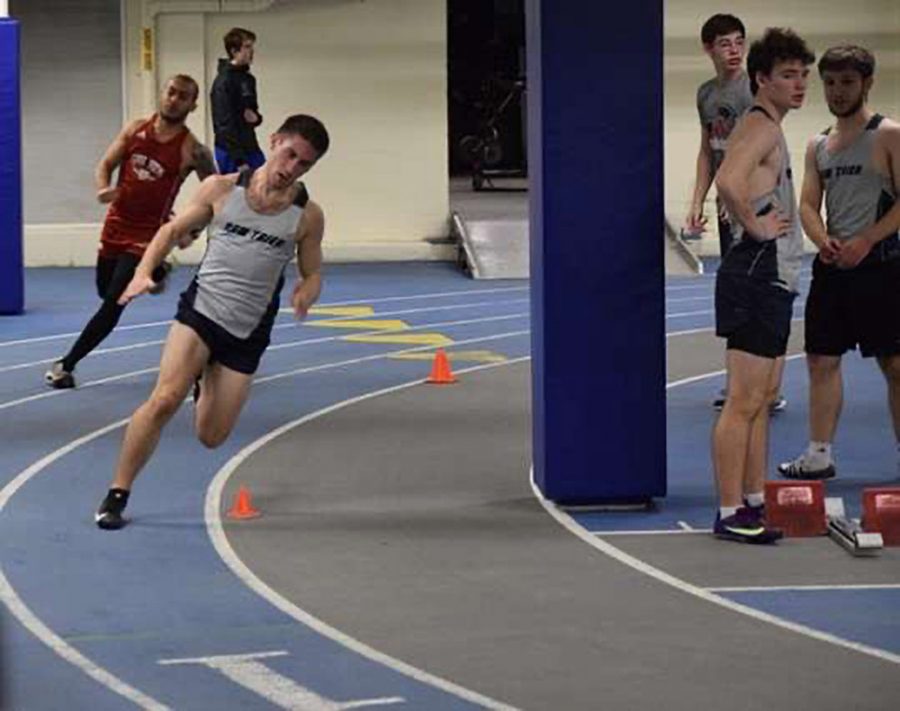Covid-19 complicates college athletics recruiting
With high school athletics shut down because of COVID-19, athletes face a new set of challenges
Since school was called off due to COVID-19 on Mar. 12, the college recruitment process has been disrupted for spring athletes.
Though recruitment methods vary from sport to sport, in normal times, coaches evaluate athletes based on competitive performance above all else. With no high school sporting events taking place, athletes are now unable to show off their skills to college coaches.
For junior Ben Yoder, a sprinter on the boys track & field team, the disruption has prevented him from improving his times to the level many college coaches expect. In the 400 metres, for example, Yoder had hoped to drop a few seconds off his personal record of 54.4 seconds this spring season.
“I was hoping to bring my [400 meter] time down to the point where I could improve in smaller increments, but now the gap is still pretty sizable, so I will have to deal with that entire chunk senior year,” he said.
In many high school sports, including track & field, junior year is the most important recruiting year because college coaches fill out much of their incoming class based on junior year performances.
While junior year is important in sports like softball, summer college clinics and club team tournaments are even more important. Because softball is less numbers-driven than track & field, players focus more on getting exposure in front of college coaches.
According to junior softball player Taylor Daniels, COVID-19 disrupting these tournaments is a major concern for uncommitted players.
“A lot of [these events] are probably going to get cancelled or postponed this summer,” said Daniels. “At that point, pretty much all you’re left with is videos of yourself hitting in the backyard or at a field if you have access to that.”
COVID-19 is also a major recruiting concern for many fall and winter athletes. In field hockey, a fall sport, offseason events are just as important for recruiting as in softball.
“I was supposed to go to four clinics throughout March and April, but they were all cancelled,” said junior field hockey goalie Bella Lauber.
Despite these challenges, most athletes who hope to compete in college have continued to work hard so they do not come back rusty when all of this is over. Daniels outlined her training regimen.
“My training has been limited, but I’ve been able to work out at home with the weights that I have and I’ve been going on runs,” she said. “I’m also lucky that I’ve got a tee and a net in the backyard and I go to hit almost everyday and I get limited field work in.”
Continuing to work out is important for athletes because it is difficult to predict when sports seasons will start up again. Lauber hopes that sports will resume by the end of the school year.
“It would be really nice if it all clears up by the end of May because we have a really big tournament in June that’s not cancelled yet, and that’s a really big exposure thing,” said Lauber.
Lauber acknowledged, though, that sports may not restart until well into the summer or later.
“I don’t think we’re going to go back to school,” she said. “Field hockey wise, I think they’re probably going to have to postpone the end of May tournament, and I think they’re probably going to postpone [other tournaments] beyond that”
Just as with everything else, recruiting for college athletics will be very different moving forward. Unfortunately, for both college coaches and high school athletes, there will be no way around it.
According to the IHSA, spring sports seasons will remain closed through at least April 30. Sports will resume if school restarts on May 1, though such a positive outcome seems unlikely in light of the ongoing pandemic.
Coaches are going to have to be more flexible and creative in how they find talent, and athletes are going to have to do their best to work around the current difficulties.
“I think that it’s just going to be a rough year when it comes to recruiting,” said Yoder. “Colleges might have a little more leniency, just because they know that kids weren’t able to train and practice how they normally would… It’s just going to be kind of an up-hill climb.”







































